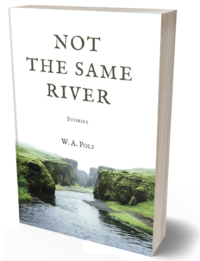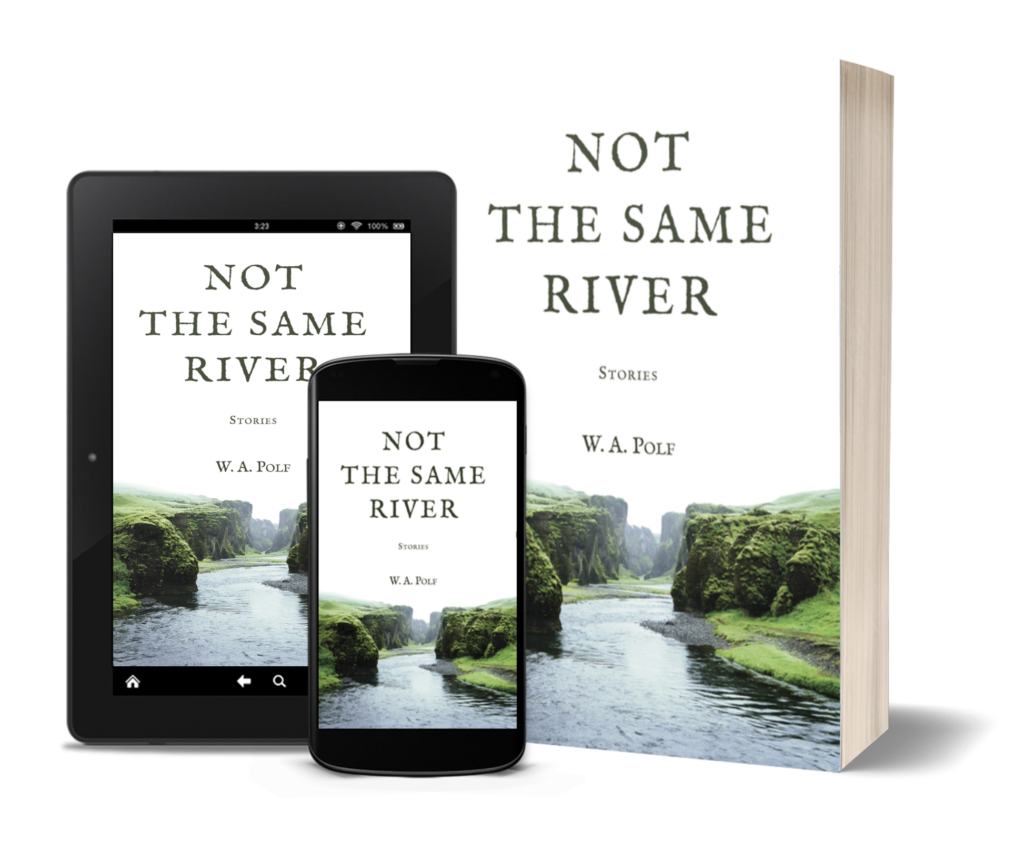“Each gem in this collection is tightly written, evocative and entertaining. The characters are believable, the varied settings recognizable yet still intriguing, and in several stories, dilemmas in the plot lead to moving and dramatic endings. Anyone who enjoys short fiction will love these stories.” – Stewart Bellus, author of Moments of Truth.
“In this powerful collection, W. A. Polf explores the complex worlds of everyday lives. His characters, often on the brink of loss—of a relationship, a parent, their own innocence—are soon forced to confront, and confess, secret parts of themselves. As one says, “[We] need to tell stories about it, even if the stories aren’t true.” Whether it’s lore about a town’s history, the mythology we build around family, or finally giving voice to a forgotten past, Not the Same River poignantly finds redemption through the healing act of storytelling itself.” Marc Dickinson author of Replacement Parts.
“The American short story is alive and well as exemplified in the superb book, Not the Same River. In fifteen stories, Polf, a gifted writer of this challenging genre, takes the reader to many locations where the protagonists face and react to unexpected and demanding situations that challenge the core of their existence. A good read, highly recommended.” J.D. Puett, author of To Be Human.
“Transcending spatial and temporal isolation, the characters of W.A. Polf’s Not the Same River wander disparate paths toward a common crossroads, confronting personal demons, loneliness, and lingering past influences in their mutual struggle for meaning amidst heightening unfamiliarity. Evocative and engaging, these insightful, stylishly crafted tales of altered perception and awareness flow unpredictably across a knife’s edge, probing a symbolic domain of consequential determination.” David Szczesny author of Anywhere I Lay My Canoe“.
BookLife Reviews, EDITOR’S PICK With a keen eye for the subtleties of human nature, Polf (author of Magical Ballyglass) explores the inner dilemmas that shape lives, especially of the desperate and those hungry for connection: a pedestrian who witnesses a traffic accident and wonders if he’s somehow the one at fault; a queer sexworker in San Francisco’s Tenderloin on the run from a proudly “psycho” cop; a newspaper delivery boy who unexpectedly befriends an old man who shares his interest in guns, to the boy’s mother’s chagrin; a husband who discovers a woman unexpectedly standing in the front hall closet. Consistently surprising, always humane, the 15 stories in this mesmerizing collection offer a profound exploration of life’s decisions, how our choices shape our future, and the powerful dilemmas we face in everyday existence. Polf’s storytelling proves both exquisite and haunting, capturing the pace of life in brisk, striking pose, delving into the underbelly of human experiences with candor but an absence of sensation or judgment: “Barnes sometimes found the predictability of their banter oddly comforting,” Polf writes of some old-timers’ coffee-shop mornings are marked by “the humdrum repetition of their dialogue.” But the stories here, wise as they are to ritual, turn on days when lives get upended or his people at last demand something more. Polf’s characters are puzzled, mistrusting, and sometimes distrusting, worrying over stray remarks (“Was she depressed, as her aunt believed? She couldn’t tell; her feelings were a mystery to her”) and navigating a world that offers no easy answers. By design, the stories often leave the reader wanting more closure, a longing that mirrors the search for meaning in our lives. The prose is a masterclass in slice-of-life storytelling, offering true-to-life scenarios that veer into often harsh and tragic storylines. Water themes recur throughout, symbolizing the flow and turbulence of life. Takeaway: Gripping stories offering a profound exploration of the human condition Comparable Titles: Nickolas Butler’s Beneath the Bonfire, Richard Ford’s Sorry for Your Trouble. Production grades Cover: A- Design and typography: A Illustrations: N/A Editing: A Marketing copy: A
Not the Same River W.A. Polf Atmosphere Press 979-8891323056 $26.99 Hardcover/$17.99 Paperback/$9.99 eBook www.atmospherepress.com Not the Same River harbors a literary countenance, its short stories reviewing the nature and impact of time and individual choice. It will attract audiences that have a special interest in short stories filled with psychological depth and inspections replete with a sense of place and growth opportunities. Take the short story ‘Lunch at the Dahesh’, for example. Here, Collin once again joins Glenda for lunch at the Dahesh (late, as usual), and together they face the end of old patterns and attractions and the beginnings of new things. A love of art bonds them—yet less apparent (initially) but equally compelling is their shared love for the art museum Dahesh that once served as the mainstay of New York’s artistic community (and their relationship), capturing moments of ‘suspended tension’ that reach from art observation into life experience. As academic debate and expression coincide with personal shifts, W.A. Polf invites reader into a world which began as set on a foundation of shared experience, and has evolved into something more: He began to feel uneasy, unsure why. Nothing seemed different; they had been in this very place many times before. Yet the situation seemed changed, as though he had shifted his position and now saw “The Water Girl” from another perspective. Contrast this with ‘The Elephant Train,’ in which an elephant train tour at the zoo reflects scenarios of loss and transformation in which the characters …lay there silently, their world dissolving around them, the new one not yet fully formed. Routines interrupted by adversity and surprise receive prominent display and attention in a story that surveys the irony of a kill-or-be-killed world and a microscopic situation. Each scenario plays out against a very different backdrop. Each short story operates as a tale of individual revelation that, when viewed as a group, relates different versions of choice, impact, closure, and recovery. Libraries and college-level professors seeking literary works that vary widely in their atmospheres, sense of place, and psychological calls and responses will find the diversity in Not the Same River satisfying. It reflects a deeper attention to revelation and growth which deserves not only individual recommendation, but can serve as appealing fodder for classroom and book club discussions. D. Donovan, Senior Reviewer, Midwest Book Review
“Not The Same River is a work of fiction penned by author W.A. Polf in the short story anthology, literary fiction, and interpersonal drama genres. Readers are invited into an intriguing and emotive collection of stories featuring ordinary people in extraordinary circumstances. Themes of ethical dilemmas and the shaping of the future are explored through diverse settings, including a paperboy’s profound choice, a woman’s marriage decision after witnessing her husband’s tragic fall, and a man’s life-altering encounter with a stranger. The narratives span locations from 1960s San Francisco to the Scottish Highlands and an Iowa farm, capturing the timeless struggle between shaping our destinies and being shaped by them.
“Author W.A. Polf has a knack for showcasing varied and emotionally stirring characters, which has resulted in an emotionally rich and thought-provoking read in this accomplished and interesting anthology. The bold and atmospheric storytelling style vividly brought to life the diverse settings, from the bustling streets of 1960s San Francisco to the stillness of the Scottish Highlands and beyond. Each story delved deep into the characters’ psyches, confronting them with moral and existential dilemmas that felt both personal and universal. I enjoyed the narrative viewpoints that allowed us close access to the characters’ speech and actions, but still let us explore and read between the lines for ourselves. The exploration of whether we shape our futures or are shaped by them builds slowly and with great accessibility to its deeper meaning, gently prompting us to reflect on our own life decisions and leaving us with much to ponder after the book is finished. Polf’s nuanced portrayal of the human condition, set against a backdrop of extraordinary circumstances, made for an extremely well-penned, compelling, and relatable read. Overall, I would certainly recommend Not The Same River for fans of literary fiction and character-driven storytelling everywhere.” K. C. Finn for Readers’ Favorites.
Polf tracks moments of personal change in this collection of literary short fiction. A woman hires a Romanian caretaker for her mother, who is slipping into dementia, only to become jealous of the bond her mother forms with the charismatic immigrant. A man moves to 1960s San Francisco to become a writer and takes a job at the city zoo, which leads to a standoff between his primary literary (and romantic) rival and a pair of lions. A nervous boy spends an initiatory night hanging out with older teens, drinking booze and siphoning gasoline (“He held the other end of the hose to his mouth with his thumb an inch from the end, just like he had learned, and began to suck, tentatively at first, then with more confidence. He could feel pressure at the other end of the hose; that should mean the gasoline was coming”). A man inadvertently causes a car accident by stepping off a curb, though in the aftermath he can’t get anyone to appreciate the guilt he feels. Across 15 stories, Polf dramatizes everyday moments of crisis and transition, from a broken toilet that needs a plumber to a rain storm that requires a mom to pick her son up from school. The author’s prose elevates the often-mundane problems in the stories to dramatic—and sometimes comedic—heights. Here, the man who causes the accident grasps for cosmological metaphors to explain it: “If he hadn’t stepped off the curb at precisely that moment, Miriam would have either already passed by or would not yet have arrived…It could be explained only in cosmic terms, Marlowe concluded, like the random chance of a particle splitting an atom and the ensuing explosion devastating everything.” Not every piece lands, and many of the tales would be improved if they pushed a bit deeper into their characters’ crises. The worlds are always richly drawn, however, and Polf proves himself a capable recorder of the human psyche.
Probing, realistic stories of aging, learning, failing, and growing. Kirkus Reviews

